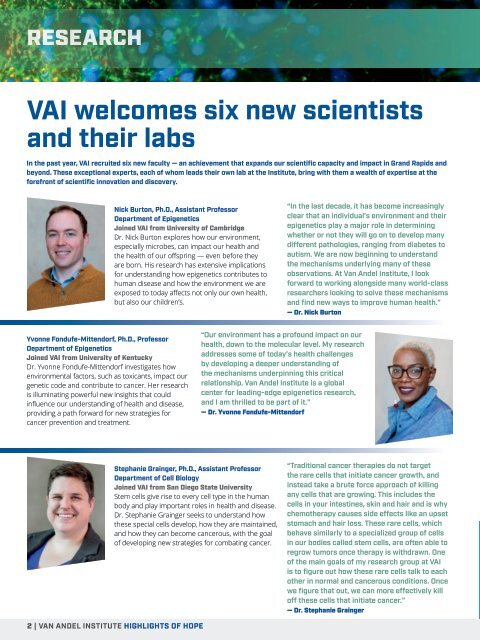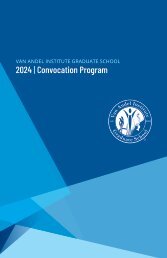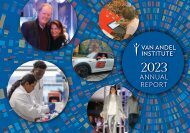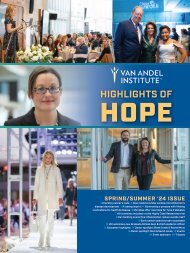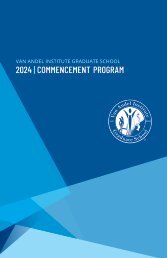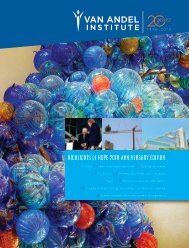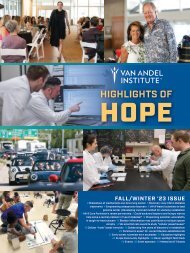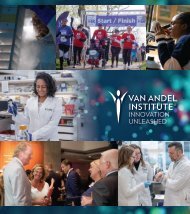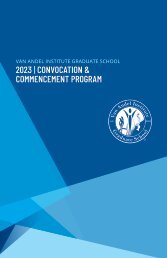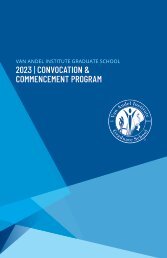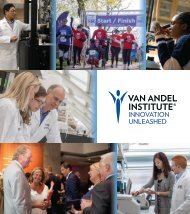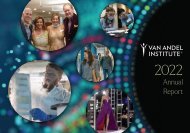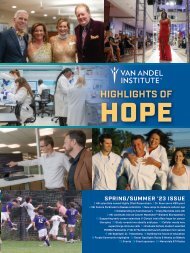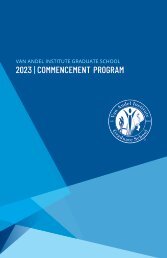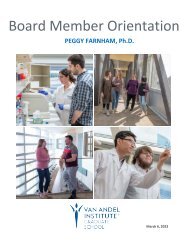2022 Spring/Summer Highlights of Hope
This is the 2022 Spring/Summer edition of Van Andel Institute's Highlights of Hope donor publication.
This is the 2022 Spring/Summer edition of Van Andel Institute's Highlights of Hope donor publication.
Create successful ePaper yourself
Turn your PDF publications into a flip-book with our unique Google optimized e-Paper software.
RESEARCH<br />
VAI welcomes six new scientists<br />
and their labs<br />
In the past year, VAI recruited six new faculty — an achievement that expands our scientific capacity and impact in Grand Rapids and<br />
beyond. These exceptional experts, each <strong>of</strong> whom leads their own lab at the Institute, bring with them a wealth <strong>of</strong> expertise at the<br />
forefront <strong>of</strong> scientific innovation and discovery.<br />
Nick Burton, Ph.D., Assistant Pr<strong>of</strong>essor<br />
Department <strong>of</strong> Epigenetics<br />
Joined VAI from University <strong>of</strong> Cambridge<br />
Dr. Nick Burton explores how our environment,<br />
especially microbes, can impact our health and<br />
the health <strong>of</strong> our <strong>of</strong>fspring — even before they<br />
are born. His research has extensive implications<br />
for understanding how epigenetics contributes to<br />
human disease and how the environment we are<br />
exposed to today affects not only our own health,<br />
but also our children’s.<br />
“In the last decade, it has become increasingly<br />
clear that an individual’s environment and their<br />
epigenetics play a major role in determining<br />
whether or not they will go on to develop many<br />
different pathologies, ranging from diabetes to<br />
autism. We are now beginning to understand<br />
the mechanisms underlying many <strong>of</strong> these<br />
observations. At Van Andel Institute, I look<br />
forward to working alongside many world-class<br />
researchers looking to solve these mechanisms<br />
and find new ways to improve human health.”<br />
— Dr. Nick Burton<br />
Yvonne Fondufe-Mittendorf, Ph.D., Pr<strong>of</strong>essor<br />
Department <strong>of</strong> Epigenetics<br />
Joined VAI from University <strong>of</strong> Kentucky<br />
Dr. Yvonne Fondufe-Mittendorf investigates how<br />
environmental factors, such as toxicants, impact our<br />
genetic code and contribute to cancer. Her research<br />
is illuminating powerful new insights that could<br />
influence our understanding <strong>of</strong> health and disease,<br />
providing a path forward for new strategies for<br />
cancer prevention and treatment.<br />
“Our environment has a pr<strong>of</strong>ound impact on our<br />
health, down to the molecular level. My research<br />
addresses some <strong>of</strong> today’s health challenges<br />
by developing a deeper understanding <strong>of</strong><br />
the mechanisms underpinning this critical<br />
relationship. Van Andel Institute is a global<br />
center for leading-edge epigenetics research,<br />
and I am thrilled to be part <strong>of</strong> it.”<br />
— Dr. Yvonne Fondufe-Mittendorf<br />
Stephanie Grainger, Ph.D., Assistant Pr<strong>of</strong>essor<br />
Department <strong>of</strong> Cell Biology<br />
Joined VAI from San Diego State University<br />
Stem cells give rise to every cell type in the human<br />
body and play important roles in health and disease.<br />
Dr. Stephanie Grainger seeks to understand how<br />
these special cells develop, how they are maintained,<br />
and how they can become cancerous, with the goal<br />
<strong>of</strong> developing new strategies for combating cancer.<br />
“Traditional cancer therapies do not target<br />
the rare cells that initiate cancer growth, and<br />
instead take a brute force approach <strong>of</strong> killing<br />
any cells that are growing. This includes the<br />
cells in your intestines, skin and hair and is why<br />
chemotherapy causes side effects like an upset<br />
stomach and hair loss. These rare cells, which<br />
behave similarly to a specialized group <strong>of</strong> cells<br />
in our bodies called stem cells, are <strong>of</strong>ten able to<br />
regrow tumors once therapy is withdrawn. One<br />
<strong>of</strong> the main goals <strong>of</strong> my research group at VAI<br />
is to figure out how these rare cells talk to each<br />
other in normal and cancerous conditions. Once<br />
we figure that out, we can more effectively kill<br />
<strong>of</strong>f these cells that initiate cancer.”<br />
— Dr. Stephanie Grainger<br />
2 | VAN ANDEL INSTITUTE HIGHLIGHTS OF HOPE


